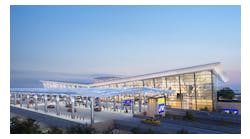Airports in Europe, Asia — even Canada — have a slight leg up on the U.S. Even though we tout some of the busiest, fastest-growing and most advanced airports in the Western Hemisphere, our pricing approach to parking is due for an overhaul.
Most U.S. parking managers are limited by rudimentary and manual approaches to pricing and travelers are faced with uncertain availability and a one-size-fits-all price to park. Not only does this create a less-than-ideal customer experience at parking facilities, but managers leave behind critical revenue at a time when airports must rely on non-aeronautical profits to invest for their futures.
One positive sign is that pre-booking systems are gaining traction in the U.S. the way they have in other parts of the world. U.S. travelers will soon be enabled to reserve a parking spot the same way they do for other elements of modern travel. But thinking a pre-booking system is the solution to today’s parking problem isn’t enough. To truly improve revenue generation and deliver a better traveler experience, airports should look to the best practices and technology solutions adopted by successful airlines and hotels.
Revenue Management 101
Airlines pioneered the concept of dynamic, demand-based pricing and revenue management more than 30 years ago, quickly followed by hotels. Today, both industries employ big-data analytics to understand traveler demand and optimize available inventory. To bring the concept into parking, consider this common pricing strategy: many parking facilities charge a set, long-term rate per day, no matter the level of demand for inventory. But is that parking revenue being maximized on busy or quiet days if the price is the same while demand dramatically differs? Are parking facilities giving customers the best deal or driving the best business performance by only accepting drive-up business at one rate structure?
By combining parking-reservation capabilities with a data-driven approach to revenue, parking managers can segment customer groups and sell the right product, at the right price, via the right channel, to the right customer, at the exact right time. It’s a concept known as revenue management.
Revenue management technology systems apply science to maximize revenue generated from a perishable product. And it works. By increasing focus on growing pre-book parking business and applying revenue management practices, trailblazing airports around the world have applied a more strategic approach to pricing for more than 10 years — with great success. The concept took off, and it’s finally starting to make strides in the U.S.
A common misconception with this approach is that pre-booked, discounted parking can dilute revenue from drive-up business. It’s an understandable concern, yet ultimately unfounded. Returns from pre-booking when using a revenue management system to price dynamically delivers revenue growth, and history has shown that travelers will quickly adapt. Many doubted this approach for hotels, but dynamic, demand-based pricing is commonplace today. And consider how quickly travelers accepted Uber’s controversial “surge” pricing. By embracing revenue management, parking managers can stimulate demand from travelers that may have never considered parking before. How? By leveraging data to target business or leisure customers with the optimal price depending on the day of week or other factors.
A Better Way to Revenue
Parking presents one of the most profitable revenue sources for airports, but the future will present new challenges. Regulatory pressure and increased transportation options may ultimately pinch travel budgets and associated revenue-generating opportunities like parking. But with the number of airline passengers anticipated to nearly double over the next decade, moving quickly to optimize parking at U.S. airports is more important than ever. By defining a strategy now, airports can start to realize better revenue results quickly and secure this critical revenue stream as the volume of travelers increases, along with the need to re-invest in supporting infrastructure.
Many airports worldwide have already implemented revenue management technology to improve their performance, so now is the time for U.S. airports to take action. Pre-booking engines are a step in the right direction. But parking managers must also recognize the value of implementing a long-term revenue management strategy that uses untapped data to make decisions based on availability, demand and other real-time factors. If carried out correctly, this strategy will not only jumpstart new revenue growth, but it will also help build a stronger, more resilient business and improve the traveler experience.
Ryan MacLagan is the parking industry sales representative and revenue management evangelist for IDeaS Americas Region. As a former hotel General Manager, Ryan brings a vast amount of travel industry expertise - directly responsible for optimizing revenues, traveler satisfaction, and service delivery. During his tenure at IDeaS, Ryan has provided direct client support, and as Product Manager, helped develop key software features including Group Pricing and Continuous Pricing Modules.




